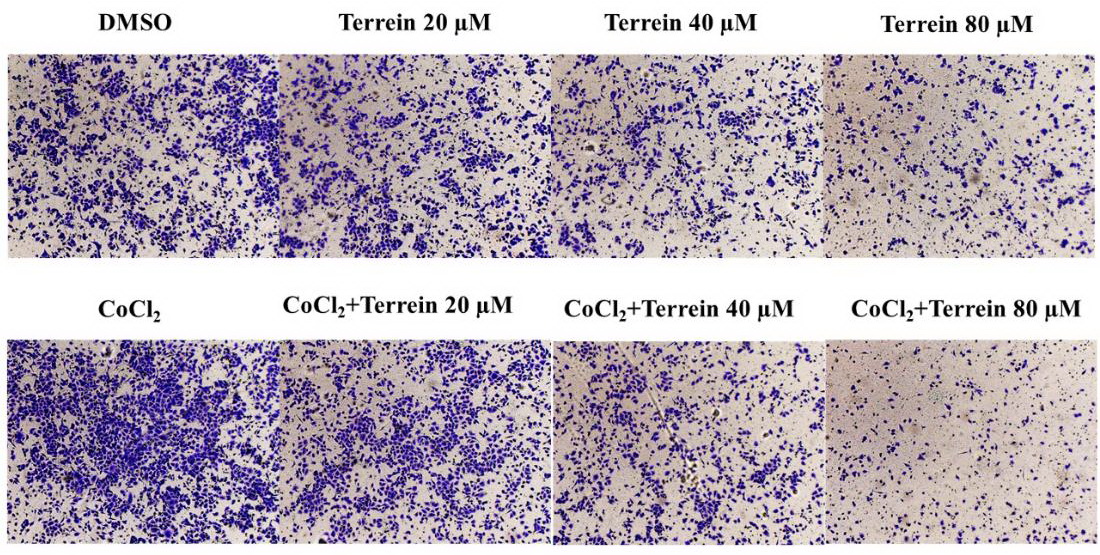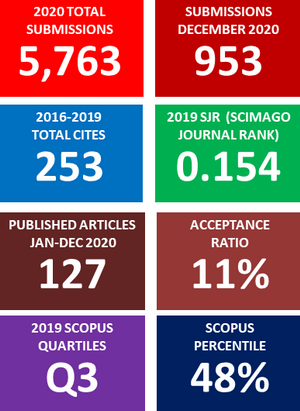Terrein Inhibits Aggressive Phenotype of A549 Human Lung Cancer Cell through Suppression of HIF-1α
DOI:
https://doi.org/10.48048/wjst.2021.10605Keywords:
Terrein, Lung cancer cells, Hypoxia, HIF-1α, MetastasisAbstract
Terrein is a fungal metabolite that has already been reported with anticancer properties. However, the effect on the aggressive phenotype of cancer cells has not been elucidated yet. In the present study, the cytotoxicity of terrein was first determined against lung cancer cells (A549) model and compared with several normal cell lines (Vero, L6, and H9C2 cells). The data demonstrated that terrein had a specific effect on A549 cells relative to normal cells with high selectivity index values. Then, the hypoxic model that recognized to induce aggressive abilities was established in A549 cells by cobalt chloride (CoCl2) stimulation. With this model, terrein could reduce HIF-1α, a marker of hypoxia, and inhibit both migration and invasion of which the effect on invasion is more explicit. Our results demonstrated that terrein has a potential new role as the anti-aggressive phenotype by inhibiting cancer cell migration and invasion through HIF-1α reduction.
HIGHLIGHTS
- Terrein, a secondary bioactive metabolite extracted from Aspergillus terreus, demonstrates anticancer effect on lung cancer cells with less cytotoxic on normal cells
- CoCl2 treatment was successfully used for creating hypoxic model which resulting in HIF-1a augmentation and aggressive abilities enhancement in lung cancer cells
- Terrein could reduce HIF-1a expression and invasive ability of lung cancer cells demonstrated the potential role as anti-metastatic agent for lung cancer
GRAPHICAL ABSTRACT
Downloads
Metrics
References
F Bray, J Ferlay, I Soerjomataram, RL Siegel, LA Torre and A Jemal. Global cancer statistics 2018: GLOBOCAN estimates of incidence and mortality worldwide for 36 cancers in 185 countries. CA Cancer J. Clin. 2018; 68, 394-424.
HW Qi, LY Xin, X Xu, XX Ji and LH Fan. Epithelial-to-mesenchymal transition markers to predict response of Berberine in suppressing lung cancer invasion and metastasis. J. Transl. Med. 2014; 12, 22.
H Raistrick and G Smith. Studies in the biochemistry of micro-organisms: The metabolic products of Aspergillus terreus Thom. A new mould metabolic product-terrein. Biochem. J. 1935; 29, 606-11.
SH Park, DS Kim, WG Kim, IJ Ryoo, DH Lee, CH Huh, SW Youn, ID Yoo and KC Park. Terrein: A new melanogenesis inhibitor and its mechanism. Cell. Mol. Life Sci. 2004; 61, 2878-85.
Y Porameesanaporn, W Uthaisang-Tanechpongtamb, F Jarintanan, S Jongrungruangchok and BT Wongsatayanon. Terrein induces apoptosis in HeLa human cervical carcinoma cells through p53 and ERK regulation. Oncol. Rep. 2013; 29, 1600-8.
YH Lee, SJ Lee, JE Jung, JS Kim, NH Lee and HK Yi. Terrein reduces age-related inflammation induced by oxidative stress through Nrf2/ERK1/2/HO-1 signalling in aged HDF cells. Cell Biochem. Funct. 2015; 33, 479-86.
M Arakawa, T Someno, M Kawada and D Ikeda. A new terrein glucoside, a novel inhibitor of angiogenin secretion in tumor angiogenesis. J. Antibiot. 2008; 61, 442-8.
A Kasorn, F Loison, T Kangsamaksin, S Jongrungruangchok and M Ponglikitmongkol. Terrein inhibits migration of human breast cancer cells via inhibition of the Rho and Rac signaling pathways. Oncol. Rep. 2018; 39, 1378-86.
WY Liao, CN Shen, LH Lin, YL Yang, HY Han, JW Chen, SC Kuo, SH Wu and CC Liaw. Asperjinone, a nor-neolignan, and terrein, a suppressor of ABCG2-expressing breast cancer cells, from thermophilic Aspergillus terreus. J. Nat. Prod. 2012; 75, 630-5.
YF Chen, SY Wang, H Shen, XF Yao, FL Zhang and D Lai. The marine-derived fungal metabolite, terrein, inhibits cell proliferation and induces cell cycle arrest in human ovarian cancer cells. Int. J. Mol. Med. 2014; 34, 1591-8.
F Zhang, M Mijiti, W Ding, J Song, Y Yin, W Sun and Z Li. (+)Terrein inhibits human hepatoma Bel7402 proliferation through cell cycle arrest. Oncol. Rep. 2015; 33, 1191-200.
A Shibata, S Ibaragi, H Mandai, T Tsumura, K Kishimoto, T Okui, NM Hassan, T Shimo, K Omori, GF Hu, S Takashiba, S Suga and A Sasaki. Synthetic terrein inhibits progression of head and neck cancer by suppressing angiogenin production. Anticancer Res. 2016; 36, 2161-8.
Y Wu, Y Zhu, S Li, M Zeng, J Chu, P Hu, J Li, Q Guo, XB Lv and G Huang. Terrein performs antitumor functions on esophageal cancer cells by inhibiting cell proliferation and synergistic interaction with cisplatin. Oncol. Lett. 2017; 13, 2805-10.
B Muz, P de la Puente, F Azab and AK Azab. The role of hypoxia in cancer progression, angiogenesis, metastasis, and resistance to therapy. Hypoxia (Auckland, NZ) 2015; 3, 83-92.
C Bayer and P Vaupel. Acute versus chronic hypoxia in tumors: Controversial data concerning time frames and biological consequences. Strahlenther. Onkol. 2012; 188, 616-27.
SH Lee, IB Jaganath, R Manikam and SD Sekaran. Inhibition of Raf-MEK-ERK and hypoxia pathways by Phyllanthus prevents metastasis in human lung (A549) cancer cell line. BMC Complement Altern. Med. 2013; 13, 271.
E Karetsi, MG Ioannou, T Kerenidi, M Minas, PA Molyvdas, KI Gourgoulianis and E Paraskeva. Differential expression of hypoxia-inducible factor 1α in non-small cell lung cancer and small cell lung cancer. Clinics (Sao Paulo, Brazil) 2012; 67, 1373-8.
LM Lopez-Sánchez, C Jimenez, A Valverde, V Hernandez, J Peñarando, A Martinez, C Lopez-Pedrera, JR Muñoz-Castañeda, R Juan JR De la Haba-Rodríguez, E Aranda and A Rodriguez-Ariza. CoCl2, a mimic of hypoxia, induces formation of polyploid giant cells with stem characteristics in colon cancer. PloS One 2014; 9, e99143.
S Li, J Zhang, H Yang, C Wu, X Dang and Y Liu. Copper depletion inhibits CoCl2-induced aggressive phenotype of MCF-7 cells via downregulation of HIF-1 and inhibition of Snail/Twist-mediated epithelial-mesenchymal transition. Sci. Rep. 2015; 5, 12410.
B Zhang, W Guo, L Yu, Fa Wang, Y Xu, Y Liu and C Huang. Cobalt chloride inhibits tumor formation in osteosarcoma cells through upregulation of HIF-1α. Oncol. Lett. 2013; 5, 911-6.
MH Kim, YJ Jeong, HJ Cho, HS Hoe, KK Park, YY Park, YH Choi, CH Kim, HW Chang, YJ Park, IK Chung and YC Chang. Delphinidin inhibits angiogenesis through the suppression of HIF-1α and VEGF expression in A549 lung cancer cells. Oncol. Rep. 2017; 37, 777-84.
MSA Okail. Cobalt chloride, a chemical inducer of hypoxia-inducible factor-1α in U251 human glioblastoma cell line. J. Saudi Chem. Soc. 2010; 14, 197-201.
ZJ Dai, J Gao, XB Ma, K Yan, XX Liu, HF Kang, ZZ Ji, HT Guan and XJ Wang. Up-regulation of hypoxia inducible factor-1α by cobalt chloride correlates with proliferation and apoptosis in PC-2 cells. J. Exp. Clin. Cancer Res. 2012; 31, 28.
S Bae, HJ Jeong, HJ Cha, K Kim, YM Choi, IS An, HJ Koh, DJ Lim and SJ Lee. The hypoxia-mimetic agent cobalt chloride induces cell cycle arrest and alters gene expression in U266 multiple myeloma cells. Int. J. Mol. Med. 2012; 30, 1180-6.
Q Li, R Ma and M Zhang. CoCl2 increases the expression of hypoxic markers HIF-1α, VEGF and CXCR4 in breast cancer MCF-7 cells. Oncol. Lett. 2018; 15, 1119-24.
Q Ao, W Su, S Guo, L Cai and L Huang. SENP1 desensitizes hypoxic ovarian cancer cells to cisplatin by up-regulating HIF-1α. Sci. Rep. 2015; 5, 16396.
Z Zhang, L Yao, J Yang, Z Wang and G Du. PI3K/Akt and HIF-1 signaling pathway in hypoxia‑ischemia (Review). Mol. Med. Rep. 2018; 18, 3547-54.
J Goutam, G Sharma, VK Tiwari, A Mishra, RN Kharwar, V Ramaraj and B Koch. Isolation and characterization of “terrain” an antimicrobial and antitumor compound from endophytic fungus Aspergillus terreus (JAS-2) associated from Achyranthus aspera Varanasi, India. Front. Microbiol. 2017; 8, 1334.
YH Lee, NH Lee, G Bhattarai, YT Oh, MK Yu, ID Yoo, EC Jhee and HK Yi. Enhancement of osteoblast biocompatibility on titanium surface with terrein treatment. Cell Biochem. Funct. 2010; 28, 678-85.
M Tafani, L Sansone, F Limana, T Arcangeli, E De Santis, M Polese, M Fini and MA Russo. The interplay of reactive oxygen species, hypoxia, inflammation, and sirtuins in cancer initiation and progression. Oxid. Med. Cell. Longev. 2016; 2016, 3907147.
BD Biosciences, Available at: http://www.fscimage.fishersci.com/cmsassets/downloads/ segment/Scientific/pdf/BD/bd_cellculture_matrigel_faq.pdf, accessed May 2020.
J Odenthal, R Takes and P Friedl. Plasticity of tumor cell invasion: Governance by growth factors and cytokines. Carcinogenesis 2016; 37, 1117-28.
Downloads
Published
How to Cite
Issue
Section
License
Copyright (c) 2021 Walailak University

This work is licensed under a Creative Commons Attribution-NonCommercial-NoDerivatives 4.0 International License.













